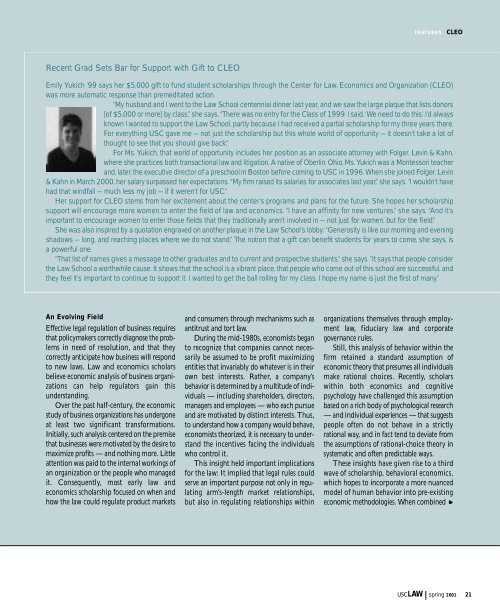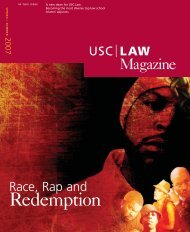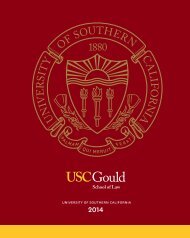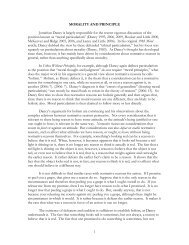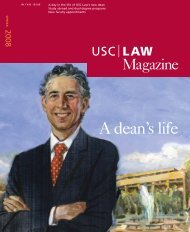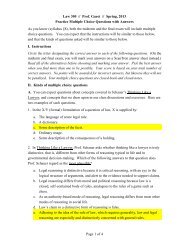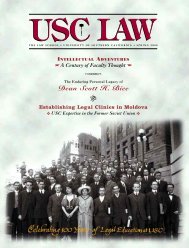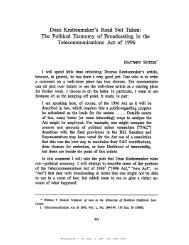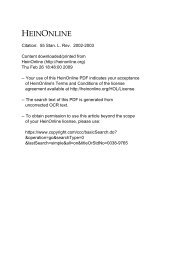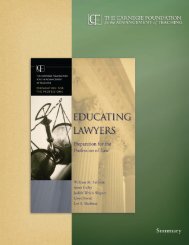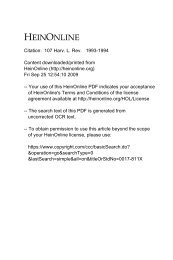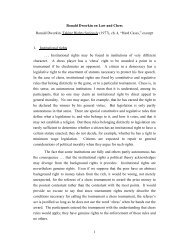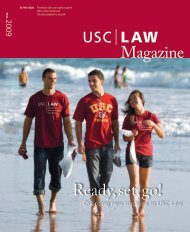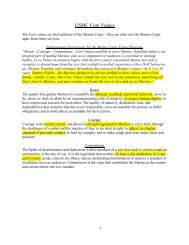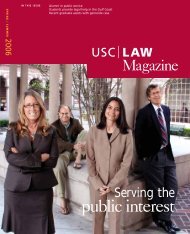usclaw - USC Gould School of Law - University of Southern California
usclaw - USC Gould School of Law - University of Southern California
usclaw - USC Gould School of Law - University of Southern California
Create successful ePaper yourself
Turn your PDF publications into a flip-book with our unique Google optimized e-Paper software.
FE AT UR ES<br />
CLEO<br />
Recent Grad Sets Bar for Support with Gift to CLEO<br />
Emily Yu k i ch ’99 says her $5,000 gift to fund student scholarships through the Center for <strong>Law</strong>, Economics and Organization (CLE O )<br />
was more automatic response than premeditated action.<br />
“My husband and I went to the <strong>Law</strong> <strong>School</strong> centennial dinner last year, and we saw the large plaque that lists donors<br />
[<strong>of</strong> $5,000 or more] by class,” she says. “There was no entry for the Class <strong>of</strong> 1999. I said, ‘We need to do this.’ I’d always<br />
known I wanted to support the <strong>Law</strong> <strong>School</strong>, partly because I had received a partial scholarship for my three years there.<br />
For everything <strong>USC</strong> gave me — not just the scholarship but this whole world <strong>of</strong> opportunity — it doesn’t take a lot <strong>of</strong><br />
thought to see that you should give back .”<br />
For Ms. Yu k i ch, that world <strong>of</strong> opportunity includes her position as an associate attorney with Fo l g e r, Levin & Ka h n ,<br />
where she practices both transactional law and litigation. A native <strong>of</strong> Oberlin, Ohio, Ms. Yu k i ch was a Montessori teach e r<br />
and, later, the executive director <strong>of</strong> a preschool in Boston before coming to <strong>USC</strong> in 1996. When she joined Fo l g e r, Le v i n<br />
& Kahn in March 2000, her salary surpassed her expectations. “My firm raised its salaries for associates last year,” she says. “I wouldn’t have<br />
had that windfall — much less my job — if it weren’t for <strong>USC</strong> .”<br />
Her support for CLEO stems from her excitement about the center’s programs and plans for the future. She hopes her sch o l a r s h i p<br />
support will encourage more women to enter the field <strong>of</strong> law and economics. “I have an affinity for new ventures,” she says. “And it’s<br />
important to encourage women to enter those fields that they traditionally aren’t involved in — not just for women, but for the fie l d .”<br />
She was also inspired by a quotation engraved on another plaque in the <strong>Law</strong> <strong>School</strong>’s lobby: “Generosity is like our morning and evening<br />
shadows — long, and reaching places where we do not stand.” The notion that a gift can benefit students for years to come, she says, is<br />
a powerful one.<br />
“ That list <strong>of</strong> names gives a message to other graduates and to current and prospective students,” she says. “It says that people consider<br />
the <strong>Law</strong> <strong>School</strong> a worthwhile cause. It shows that the school is a vibrant place, that people who come out <strong>of</strong> this school are successful, and<br />
they feel it’s important to continue to support it. I wanted to get the ball rolling for my class. I hope my name is just the first <strong>of</strong> many.”<br />
An Evolving Field<br />
Ef f e c t i ve legal regulation <strong>of</strong> business re q u i re s<br />
that policymakers correctly diagnose the pro b-<br />
lems in need <strong>of</strong> resolution, and that they<br />
c o r rectly anticipate how business will re s p o n d<br />
to new laws. <strong>Law</strong> and economics scholars<br />
b e l i e ve economic analysis <strong>of</strong> business organizations<br />
can help regulators gain this<br />
u n d e r s t a n d i n g .<br />
O ver the past half-century, the economic<br />
study <strong>of</strong> business organizations has undergone<br />
at least two significant transformations.<br />
In i t i a l l y, such analysis centered on the pre m i s e<br />
that businesses we re motivated by the desire to<br />
m a x i m i ze pro fits — and nothing more. Little<br />
attention was paid to the internal workings <strong>of</strong><br />
an organization or the people who managed<br />
it. Consequently, most early law and<br />
economics scholarship focused on when and<br />
h ow the law could regulate product mark e t s<br />
and consumers through mechanisms such as<br />
a n t i t rust and tort law.<br />
During the mid-1980s, economists began<br />
to re c o g n i ze that companies cannot necessarily<br />
be assumed to be pr<strong>of</strong>it maximizing<br />
entities that invariably do whatever is in their<br />
own best interests. Rather, a company’s<br />
behavior is determined by a multitude <strong>of</strong> individuals<br />
— including shareholders, dire c t o r s ,<br />
managers and employees — who each pursue<br />
and are motivated by distinct interests. T h u s ,<br />
to understand how a company would behave ,<br />
economists theorized, it is necessary to understand<br />
the incentives facing the individuals<br />
who control it.<br />
This insight held important implications<br />
for the law: It implied that legal rules could<br />
s e rve an important purpose not only in re g u-<br />
lating arm’s-length market relationships,<br />
but also in regulating relationships within<br />
organizations themselves through employment<br />
law, fiduciary law and corporate<br />
g overnance ru l e s .<br />
Still, this analysis <strong>of</strong> behavior within the<br />
firm retained a standard assumption <strong>of</strong><br />
economic theory that presumes all individuals<br />
make rational choices. Re c e n t l y, scholars<br />
within both economics and cognitive<br />
p s ychology have challenged this assumption<br />
based on a rich body <strong>of</strong> psychological re s e a rc h<br />
— and individual experiences — that suggests<br />
people <strong>of</strong>ten do not behave in a strictly<br />
rational way, and in fact tend to deviate fro m<br />
the assumptions <strong>of</strong> rational-choice theory in<br />
systematic and <strong>of</strong>ten predictable ways.<br />
These insights have given rise to a third<br />
w a ve <strong>of</strong> scholarship, behavioral economics,<br />
which hopes to incorporate a more nuanced<br />
model <strong>of</strong> human behavior into pre - e x i s t i n g<br />
economic methodologies. When combined<br />
<strong>USC</strong>LAW s p r i n g 2001<br />
2 1


